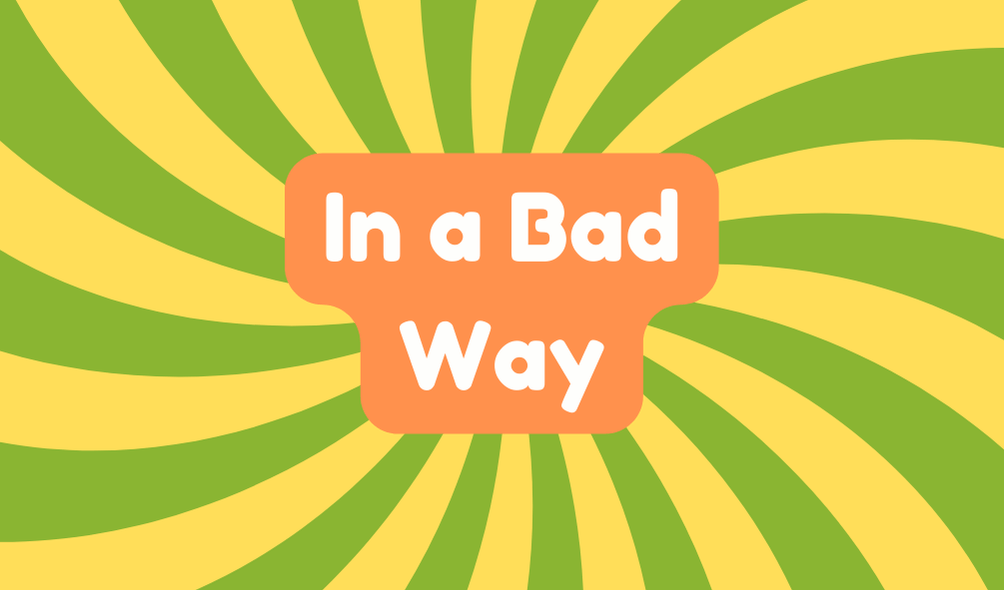The phrase "in a bad way" refers to a person's emotional distress or poor well-being. Its origins are unclear, dating back to the early 1800s, though no solid literary evidence exists. Common examples include someone feeling low after a breakup or dealing with overwhelming stress at work. Miscommunication can arise from its use, emphasizing the importance of context. Understanding this term is key, as it reflects deep emotional states and interpersonal dynamics worth exploring further.
Synonyms
Synonyms for the phrase "in a bad way" reflect its various interpretations and usages. They often describe a negative condition or poor state, highlighting the importance of context in communication. The diversity in terminology conveys not just the state of being but also the emotional nuances intertwined in interactions.
- Deteriorated demeanor
- Distressed situation
- Unhappy disposition
Through such synonyms, one can grasp the implications of seemingly simple phrases. Each term resonates with the significance of how we convey and perceive emotions, urging a deeper consideration of language's impact on relationships and understanding in daily life.
Example of Sentences
The phrase "in a bad way" often surfaces in conversation, yet its implications deserve closer scrutiny. Its nuanced meanings can create confusion or misinterpretation. For example, people might express:
- Sympathy for a friend grappling with emotional struggles.
- Concern about a pet exhibiting unusual behavior.
- Discontent over a project that spiraled out of control.
These instances serve as conversation starters, providing real-life applications of the phrase. Understanding how "in a bad way" reflects emotional states allows for deeper connections. By recognizing each context, individuals can navigate discussions more thoughtfully, fostering clearer communication and reducing the likelihood of misunderstandings in relationships.
Origin
Many phrases we use daily carry intriguing historical backgrounds that can shed light on their meanings. "In a bad way" is no exception, as its origins can be traced back to the early 1800s. Though no concrete literary proof exists, this phrase likely reflects the nuanced emotions in human interactions. Its usage explores the domain of historical linguistics, emphasizing how language evolves with social dynamics and emotional intelligence.
| Component | Meaning | Context |
|---|---|---|
| Historical Basis | Early 1800s | Communication |
| Emotional Aspect | Conveying distress | Relationship dynamics |
| Linguistic Evolution | Evolution of interpretation | Miscommunication |
| Cultural Reflection | Social interactions | Emotional insight |
Collocations
Collocations surrounding the phrase "in a bad way" reveal how language can shape perceptions and attitudes in communication. They often highlight the emotional impact of negative situations, suggesting deeper implications. Consider these vivid phrases:
- "Feeling in a bad way after a breakup"
- "Expressing thoughts in a bad way unintentionally"
- "Dealing with consequences in a bad way"
These collocations illustrate not only the state of being but also the perceptions attached to it. Language, consequently, becomes a lens through which negative circumstances are expressed, influencing how individuals are understood and how they understand themselves in the context of their experiences.
How to Use in Everyday Language
Using the phrase "in a bad way" in everyday conversation requires a careful understanding of context and intent. To achieve communicative clarity, one must consider how the phrase can be interpreted in various social interactions. Misusing this expression may result in unintended implications, potentially damaging relationships. It is essential to gauge the emotional state of both the speaker and the listener. For instance, when discussing a sensitive topic, one might choose a more neutral phrase to avoid further distress. Therefore, recognizing the power of language guarantees that conversations remain constructive, rather than spiraling into misunderstandings or negative sentiments.
Why Is It Still Relevant Today?
While some might dismiss the phrase "in a bad way" as an outdated expression, its relevance persists in today's complex social landscape. The concept embodies cultural relevance, highlighting how miscommunication can still ignite conflict. In an age where emotional intelligence is paramount, understanding the nuances behind interactions labeled as "bad" shapes healthier relationships. This phrase serves as a reminder of the need for clear communication, especially in diverse environments. As society evolves, phrases like "in a bad way" illuminate the importance of mindfulness in dialogue, challenging individuals to navigate emotional awareness and fostering connections that avoid misunderstanding and hurt.







